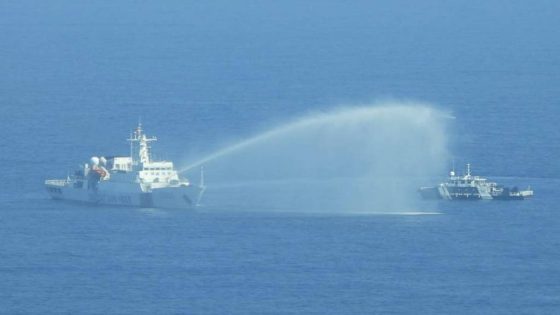Rep. Darrell Issa, R-Ca., urged his fellow members of Congress to educate themselves on the crises within the South China Sea region and protect international law.
The first keynote speaker at the Center for Strategic and International Studiesâ Fourteenth Annual South China Sea Conference said forces in the region need to operate legally within international law, which the Peopleâs Republic of China has not been doing.
Issa, a senior member of the House Foreign Relations Committee, said the transition of Hong Kong from the United Kingdom to China was peaceful, with a gradual change promise including two economic systems under one government. That promise was broken, he said.
âThat promise will be broken again if Taiwan were to be merged officially back into China,â Issa said. âSo, for the time being, the United States has to put a pause on closer relations with China, on turning over more power to China.â
Two protesters disrupted the representativeâs keynote speech a couple minutes apart chanting âU.S. bases out now,â saying U.S. involvement and militarization in the Philippines should cease. Later, six more protesters with signs interrupted the keynote. All were escorted out of the event as their voices rang through the building.
âEvery day I try to remind myself that the disruption of other peopleâs opportunity to express their free views is sometimes thwarted by people who silence them,â Issa said after the first two protesters left.
âSo, every day, I close my windows and doors and try not to hear too much of that amplified speech, but at the same time, we are having a lively discussion about the best way not to put the Philippines in harmâs way and to keep them out of harmâs way,â Issa said.
Issa said there is âaggressiveâ activity in the region where rights to free travel on the open seas and territorial rights of Vietnam, Taiwan and the Philippines are being squashed by government backed Chinese vessels every day.
âSo, we donât have the luxury of saying, do nothing,â Issa said. âIf we do nothing, we will see a swallowing up, directly and indirectly, of these countries and these territories.â
To stop aggressive activity on the waters, Issa said training and defense capabilities need to increase instead of just supplying boots on the group. He said sometimes countries in the region need to have their own form of a Coast Guard,
âWe are looking at defense capability, and hopefully, if my aspirations and Senator Hagerty and others realize, we will be increasing the ability for the Philippines and throughout the region, people simply to say the rules of international law need to be obeyed, and to get them obeyed, sometimes you need to have your own, and Iâll call it Coast Guard, because I believe thatâs really what a big part of it will be,â Issa said.
Assistant Secretary of Defense for Indo-Pacific Security Affairs Ely Ratner, the conferenceâs afternoon keynote, said the U.S.â alliance and commitments with the Philippines are âironclad,â as the U.S. continues to support rights to fly, sail and operate where international law allows.
âLooking back, 2023 was a transformative year for making U.S. force posture in the Indo-Pacific more mobile, distributed, resilient and lethal,â Ratner said.
U.S. Force Posture Initiatives are included in the alliance with the Philippines to show military strength and readiness. Ratner said this yearâs budget is an opportunity to deliver on the new agreements on force posture with the Philippines.
Cristina Stassis is an editorial fellow for Defense News and Military Times, where she covers stories surrounding the defense industry, national security, military/veteran affairs and more. She is currently studying journalism and mass communication and international affairs at the George Washington University.
Source Agencies


